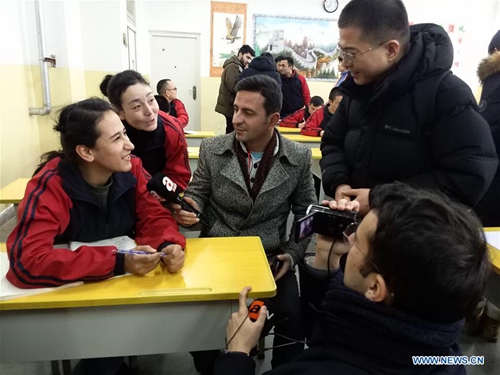
Foreign journalists interview students at Kashgar vocational education and training center in Kashgar, northwest China's Xinjiang Uygur Autonomous Region, Jan. 13, 2019. A media group consisting of people from six countries praised the development and stability of Xinjiang after visiting the region. The Silk Road Celebrity China Tour was held from Jan. 9 to 16 in Xinjiang, with 12 media representatives from Egypt, Turkey, Pakistan, Afghanistan, Bangladesh and Sri Lanka visiting locals and a vocational training center. Photo: Xinhua
Stability is highlighted in the annual government report of Northwest China's Xinjiang Uyghur Autonomous Region. Its official vowed to carry out measures to combat terrorism, extremism, and to maintain stability in the year ahead.
Speaking at the region's annual two sessions, Shohrat Zakir, chairman of the regional government, hailed Xinjiang's stable social environment in the past year. He said that social stability has contributed to the region's economic and social development, Xinjiang Daily reported on Sunday.
Zakir vowed that maintaining social stability will also be an important task in 2019. To accomplish this task, the government will carry on with efficient measures of fighting terrorism, sending officials to villages in order to serve local people, and will continue to fight terrorist and extremist ideologies. Zakir also said maintaining ethnic unity and religious harmony is the most important large-scale work for Xinjiang. It will push forward the work of anti-extremism and allow religious groups and clergies to guide people to resist the influence of extremist religious content.
The word "stability" has appeared 38 times in this report.
The Xinjiang regional government has built a dimensional and information-oriented public security system and has deployed human and technology resources to help ensure the region's safety, Zakir said.
At a road security check in Tumxuk, a gateway to Xinjiang, several terahertz body scanners were introduced since 2017 to check for any metal or explosive objects being brought through, and it has worked very well during the two years, Xu Yongsheng, vice head of the road security check, told the Global Times on Monday.
Xinjiang hasn't seen a terrorist incident in 21 consecutive months and public security incidents are declining in frequency, Zakir said in October.
The Xinjiang government has worked out new methods to eradicate threats to social stability in recent years. The vocational training camp is one example, Zhu Weiqun, former head of the Ethnic and Religious Affairs Committee of the National Committee of the Chinese People's Political Consultative Conference, told the Global Times.
The regional government invited diplomats from 12 countries in early January to visit its vocational training and education centers, when these centers were in spotlight of foreign media reports.
Showcasing Xinjiang's achievements to other countries allows the region to encourage international support in combating terrorism and helping to prevent negative influences from outside, said Zhu.
Echoing Zhu, Li Wei, a Beijing-based counter-terrorism expert who was invited to visit the education centers in Xinjiang in November, told the Global Times that now Xinjiang has set an example for other countries fighting terrorism and extremism, due to its efficiency and achievements.
However, experts warned that the region should not loosen its endeavors to safeguard social security and stability, as various threats still linger.
Ulam Abudukadir, an inspector of the united front work department of Xinjiang, said that some parts of the region have seen a tendency of "de-sinicization" and the spreading of extremism has posed great threat to these area's social stability, Xinjiang Daily reported.
Few people have worshiped foreign countries and to lead three evil forces - terrorism, separatism and extremism.
Such a tendency requires officials from religious groups and the united front work department to stick to their politic stances: to firmly fight these three evil forces and to push forward the sinicization of Islam, said Ulam Abudukadir.



